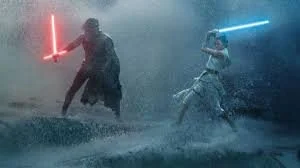The acclaimed TV series The Expanse, based on the sprawling novels by James S. A. Corey, completed Season 3 last week. That the show is still running is something of a fan-created miracle. Syfy didn’t sign up for the third season until a Twitter storm erupted in fandom. Then, in early May of this year, Syfy declined to renew the series for a fourth season, effectively canceling the show before Season 3 was even half over. Another Twitter storm blew up, and an online petition to keep the show going gathered in excess of 100,000 signatures. Fans lobbied Amazon and Netflix to pick up the show.
At the eleventh hour, Jeff Bezos came through, announcing that Amazon Prime would pick up the show. He invited the cast to a gala dinner for his new space-exploration venture, Blue Horizon, and laid out his vision for colonizing the solar system.
What about this series has so caught the hearts and minds of fans that they refuse to let it go the way of Firefly?
It’s About Human Curiosity, its Dangers and Promise — Lisa Mahoney
What’s so different about The Expanse? Well, if I didn’t convince you earlier, in science fiction certain storylines recur: the stranger in a strange land (main character’s assumptions are thrown off balance by some kind of travel: time or other), dystopias where various human flaws have finally done us (almost) in, battles for power in distant stars in the distant future, twists on gender roles and power, and so on. 2001: A Space Odyssey played with the idea that our civilization was deeply influenced by an alien presence millions of years old and not by God, but by the time we’re advanced enough to realize it, we still haven’t developed enough. We just have to mess with the monolith, a Pandora’s Box, even though we know we might wake it up and alert the Beings Much More Advanced and Older than we. We’re practically begging them, “Hey, here we are! Come conquer us!”
The inescapable human characteristics examined in 2001 are curiosity, and its follow-through, the desire to explore and conquer new horizons.
The Expanse plays with these same human traits and adds an interesting twist. By the end of Miller’s leading questions in Season 3, Holden and the Solar System realize that the aliens that made the ring billions of years ago and the pathways to whatever is beyond must be light-years more advanced than we. But why aren’t They waking up? Why aren’t The Creators of the Ring answering Miller’s call? Miller worries there’s something even more powerful out there. And he picks humans to investigate. We’re naturals at this getting-in-over-our-heads business.
So the series asks, why must humans explore? Colonize? Even when it seems self-evident that the safest thing to do is be quiet in our own Solar System and hope that super-powerful aliens who have ignored us for two billion years will continue to do so?
The answer is that we’re the same civilization that opened Pandora’s Box, the same civilization that sent a probe out into the galaxy with a diagram showing exactly where we are. Any civilization advanced enough to catch the probe could destroy us. Or, invite us to a shipboard party. Don’t forget your towel!
The humans in The Expanse are as underdeveloped as gangs of territorial rats exploring a maze of electrical wiring conduit in a city billions of years stilled. We bumble along the path for no reason other than that it is there, assuming a better place at the far end, but in actuality the wires and conduit were laid for a purpose that is so technologically advanced that we can’t begin to comprehend its purpose, much less that we shouldn’t poop in it, or try to bite through its protective layers.
By the end of Book and Season 3, fans are left as wildly curious as the Belters and Miller. Isn’t the grass greener on the other side of the Ring? Who could have done this? What if they’re still out there? We must know! You can’t let the series die, Jeff!
What an interesting twist on the ancient-alien-influences idea. We’re left with deeply disturbing evidence of our tiny, unimportant place in the Universe. In other words, The Expanse is sci-fi at its best.
Getting the Hang of Belter Slang — CS Peterson
"Pandora" by John William Waterhouse 1896
I came late to this party. After hearing Lisa and Mark rave about this series for years I finally picked up Book 1, Leviathan Wakes. An intimidating door-stopper, it weighs in at a hefty 577 pages. On CD or Audible it’s 21 hours of listening that you really have to pay attention to (not recommended for the commute). I confess I started watching the Syfy series before I tackled the book, and the first few episodes took some work. I was not the only one slow to warm to the series, or to conclude that it was well worth the effort to get past the initial learning curve. Rotten Tomatoes calculated the first season’s score at 76%, but Season 2 was 95% and this year it’s 100%.
What hooked me was the depth of vision, both in the books and in the show. The visuals in the television show are gorgeous. The opening credits alone tell a story worth watching. They show a warming earth, overpopulated, compensating for human created disasters always after the fact. It is heartbreaking to see the glaciers melting, the statue of Liberty overcome by rising water, then heartening when levees are built to protect her from the waves. We see the moon colonized, then Mars, the asteroid Ceres, Jupiter’s moons, Saturn’s rings. At the end of the minute-long intro, our point of view is from Saturn towards the Sun. We look back at the solar system and feel anchored in a world where humans have built places for themselves in the dark.
So what do you need to get your ear tuned to those first few shows? Patience, mostly with the character of Miller, who mumbles in Belter pidgin and makes cryptic gestures in Belter sign slang. I had to watch the first episode three times before my ear got the hang of it. Kind of like listening to Shakespeare when I was a kid, you just have to let it wash over you. On the upside, it is much easier to learn than Klingon.
Miller is the hero of Season 1, a rumpled, jaded noir cop wandering after his heart in a system about to go to war. An added bonus is the real-world feel of the representative casting and the powerful female leads that place this work high above the Bechdel bar.
I just love watching this story. And now reading it. The Expanse is hopeful. It is a vision of the future of humanity that is neither dystopian nor utopian. Humans are as difficult to get along with as ever. Still wrecking things, being unfair and unjust. There is division, and saber rattling, and war. But somehow, the better angels of human nature manifest themselves at odd moments in odd individuals, just enough to keep us from destroying ourselves. By the end of Book 3, imperfect humans and imperfect alien technology are on the verge of exploring greater mysteries than a missing dame in a noir/political/techno/space opera with the same complicated, messy, tragic panache that started it all. And there are still six books to go!
Nuanced Adaptation from Books to Screen — Mark Springer
Lisa was the first to recommend The Expanse novels to me, so she gets full credit as Fiction Unbound’s early adopter. It took me a while to get around to reading the first novel, though, mostly because my wife and I had a newborn at the time and I couldn’t concentrate long enough to read five consecutive sentences, let alone 500-plus pages of densely plotted space opera. Leviathan Wakes proved to be worth the wait, however, and soon I was working my way through the rest of the books.
The fictional world of The Expanse keeps growing: Seven novels, plus short stories, novellas, and digital comics, with the 8th novel publishing December 4, 2018.
This was shortly after the first season of the TV series aired, so the timing was perfect for an A/B comparison of the books and the show. As a writer, I find it informative to see how stories change when they’re adapted from page to screen. The medium isn’t the message, but it does play a defining role in how a story gets told. Narrative devices that work in prose often don’t translate to screenwriting, and vice versa.
In the case of The Expanse, it is interesting to see how the TV adaptation significantly alters the narrative structure used in the books, while preserving most of the key plot points and following the same overall dramatic arc. The biggest change is that a major point-of-view character not introduced until Book 2 shows up right away in Season 1. The character in question, Chrisjen Avasarala, gives viewers a behind-the-scenes perspective on the solar-system-wide political machinations that happen mostly off-stage in Book 1. Having access to Avasarala from the start changes how the story is told, introducing new opportunities for conflict, tension, and suspense, and making it impossible to fit the full plot of Book 1 into a ten-episode season. As a result, the books and seasons don’t line up, plot-wise, until the conclusion of Season 3. And that’s just scratching the surface. This book-to-screen comparison could be the basis for a master class, given the various other nips and tucks the screenwriting team makes to streamline the story and parcel the action into episode-friendly mini-arcs that work on their own and as part of the larger story.
What made me stay for the series is the same thing that keeps me coming back for each new book in the series (is it December yet?): the characters and their relationships; the steadfast realism of the science, even in the story’s most hypothetical leaps; and the nuanced portrayal of a complicated species struggling to understand itself and its place in an unimaginably vast universe. There is hope in The Expanse, as C.S. Peterson said, despite the often grim circumstances, and despite the fact that human beings often seem doomed, individually and collectively, by our worst impulses. It’s a pragmatic hope, the kind that doesn’t fade when things get dark. The kind that makes it possible to believe we can do better than we’ve done in the past. The kind of hope we need now more than ever.











There is so much out there to read, and until you get your turn in a time loop, you don’t have time to read it all to find the highlights.